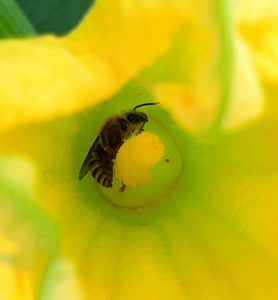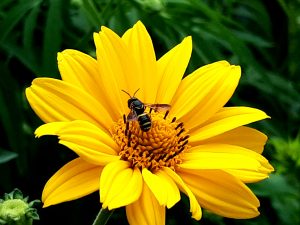Citizen Science is the Bee’s Knees
Text and photos by Laura Schaefer
Shutterbee is a Citizen Science project of Webster University, St Louis University, the St Louis Zoo and Missouri Botanical Garden with additional support by Missouri Department of Conservation and the Living Earth Collaborative. It seeks backyard gardeners and bee enthusiasts of the St Louis region to monitor their flowers throughout the summer for bee abundance, diversity and behavior. Participants are given 4-6 hours of initial training and conduct 25-45 minute bi-weekly photographic surveys of the bees and flowers of use in their yards. Data and pictures are uploaded to iNaturalist where it is reviewed by professional and amateur entomologists. Assistance with bee and plant identification is provided.

The collective data of all participants is then gathered into one database where patterns are considered. The overall goal is to understand how landscape features and land management decisions affect bee diversity and behavior. With 227 participants by year two, already 108 different species of bees have been observed with a total of 16,762 observations! That just shows you the power of Citizen Science. Can you imagine how difficult it would be for 1 scientist to make over 16,000 observations in 227 different yards?
The highlights of participating in Shutterbee have been many-fold. While looking for bees, I have noticed, photographed and learned about many other insects on the plants in my yard, including pollinating wasps, beetles and flies. After learning that two different wasps I observed needed sand to nest in it occurred to me that there is a pond near me with human-made sandy beaches. My neighbors are unknowingly providing nesting sites, while I am providing their food. One of the wasps is a predator of stink bugs. Being a gardener, I appreciate this wasp for helping me protect my zucchini plants through organic pest control. Another exciting find includes seeing two different kinds of cuckoo bees. Cuckoo bees are parasitoids, which means they are only parasitic during their larval stage of life. Females lay their eggs in another bee’s nest. The cuckoo larva consumes the host larva and the food provisions the host parent has collected for their baby. In addition, cuckoo bees are selective of what species of host bee they parasitize and in my case the bees they desire are also selective in needing pollen from very specific native plants. What all of this means is – if I didn’t have a healthy population of a particular native wildflower, I would not have a healthy population of the specialist host bee that collects from it and therefore I would also not have the cuckoo bee.

In other words, cuckoo bees can be indicators of a healthy ecosystem. And lastly, for me it’s the bee’s knees to find specialist bees. Specialist bees only feed from selective wildflowers. To support a healthy population of specialists means having a good number of plants available for them to feed their babies the pollen they need to grow. It isn’t unlike Monarch caterpillars requiring milkweed. You always hear how diversity is good, but providing an abundance and diversity of flowering plants throughout the growing season has been supported by the diversity and abundance of bees I have found in my yard and that has made all of my efforts worthwhile.
Registration and training for the 2021 season has closed, however interested participants can email shutterbee@webster.edu to get on a listserv with updates about the project. More information, including what you can do to help bees can be found at https://sites.google.com/view/millerstruttmann/shutterbee You can also follow Shutterbee on Facebook and Instagram.
CLIFFTOP, a local nonprofit organization, is focused on preserving and protecting area blufflands.
A version of this article appeared in the August 25, 2021 edition of the Republic-Times.
©2021 all content rights reserved Clifftop NFP
Comments are currently closed.
